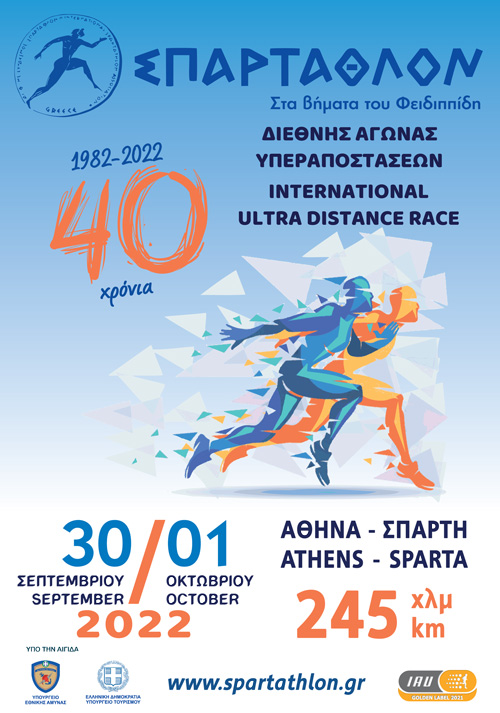A few years ago I published an article entitled "On marathons and ultramarathons". I was interested there on how the mean velocity suddenly drops for distances beyond the marathon. A more recent article refined the conclusions of that first article identifying four different regimes in running. Working on these articles got me interested in very long races, the "ultramarathons". My current work in collaboration with G. Purdy on the new scoring tables also pushed me into understanding better the mechanisms involved in ultra-running.
I was discussing these points with my friend, marathon runner extraordinaire, K. Tsagkarakis and I learned from him the existence of a classical race which aims at reproducing a less known (at least to non-greeks) Pheidippides feat. I had already heard about the Spartathlon but during my discussion with my friend Kostas I learned about the Pheidippides run.
When the Persians attacked Greece the citizens of Athens sent Pheidippides to Sparta to ask for military help. According to Herodotus, Pheidippides arrived to Sparta the very next day. As history has it, the Spartans could not leave before the moon were full and thus would not arrive on time for the battle. So, Pheidippides ran back to Athens bringing the not so encouraging news. The Athenians decided to confront the Persians at Marathon and we all know how that ended. As for Pheidippides, he expired just after bringing the good news of the victory in Marathon to the magistrates of Athens. (But there is no mention of this in Herodotus, the first account appearing five centuries later in Plutarch, who, moreover, is mentioning a different runner. Most probably the whole expiring marathon runner story is a romantic invention).
Pheidippides journey to Sparta kindled the interest of long-distance runners and in 1982 four british officers tried to cover the distance from Athens to Sparta (roughly 250 km) in less than 36 hours. One of them succeeded and two more covered the distance but taking more than 36 hours. That was the birth of the Spartathlon. It attracted immediately the interest of runners and since 1982, the Spartathlon is held annually. The route has been normalised to 245 km and the runners must cover it in under 36 hours. It starts at the foot of the Acropolis and, in Sparta, the finish line is at the statue of king Leonidas. There exist check points along the route where the runners may be taken off the race if they fail to meet the time cut-off. And not everybody may enter the race, the selection criteria are quite tough and the total number is limited to 400. In fact due to the popularity of the race a ballot system has been introduced for all but the elite athletes who exceed the criteria by a large margin.
The recordman of the course is none other than Y. Kouros, the famous greek ultra-marathoner, with 20:25:00 dating back to 1984. In 40 years of history there have been only 8 greek victories, the most recent one being this year's victory of F. Zisimopoulos in 21:00:48. Kouros and Zisimopoulos hold the 6 best performances. The women's record is held by P. Bereznowska in 24:48:18, from 2017. She is in fact 50th overall when men's and women's performances are pooled together.
But what Pheidippides did was not simply going to Sparta. He came back to Athens the next day. So, long-distance runners, finding that the Spartathlon is too easy, decided to reproduce Pheidippides feat and the Φειδιππίδειος δρόμος was born.




No comments:
Post a Comment